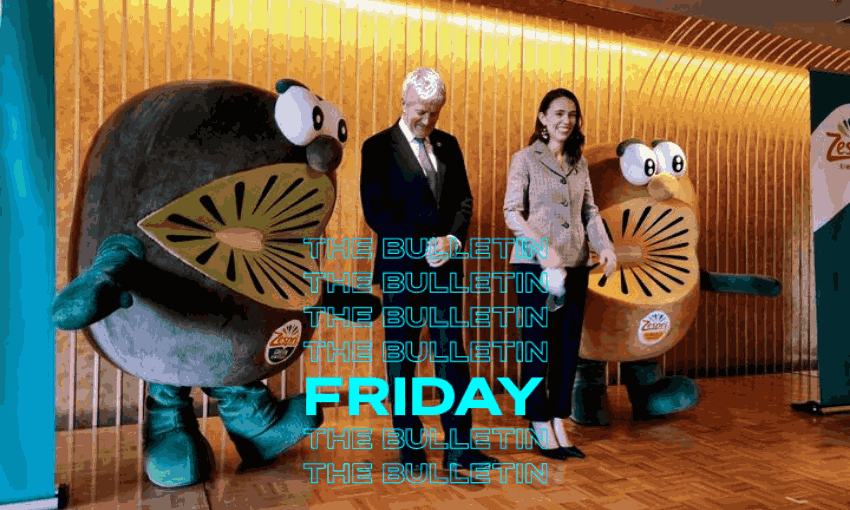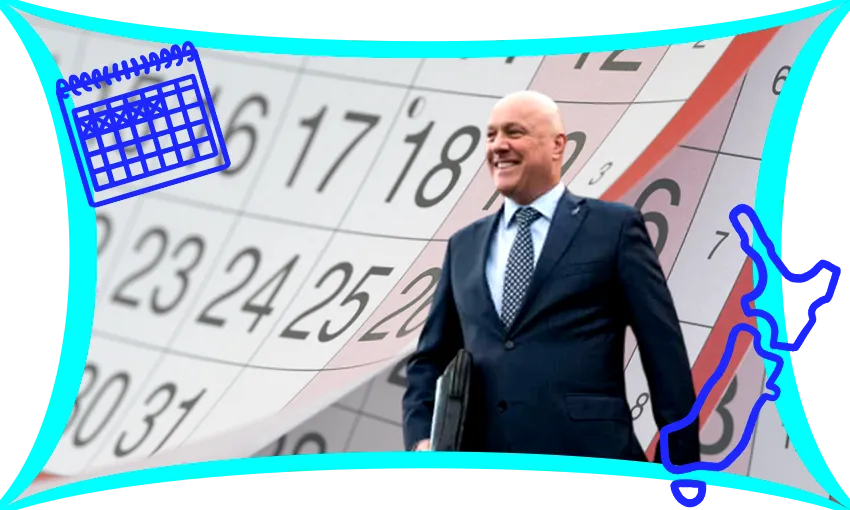PM’s trade trip bears fruit
The trade mission to Singapore and Japan delivers results but concerns over Indo-Pacific security dominate.
Mōrena and welcome to The Bulletin for Friday, April 22, by Anna Rawhiti-Connell. Presented in partnership with Z Energy.
In today’s edition: political jousting over inflation; new coach for Black Ferns; flying ferries; but first, a look at the PM’s trip overseas.
Jacinda Ardern and Damien O’Connor pose with kiwifruit mascots (Image: RNZ / Craig McCulloch)
The Singapore stretch
The prime minister is five days into her first trade mission in two years, which began in Singapore. As described by Newsroom’s political editor, Jo Moir, this portion of the trip was a sprint set against a backdrop of hotels and conference rooms. There seemed to be a few glitches that perhaps point to a trip organised in a hurry, encumbered by the logistics of travel during a pandemic. Moir observed that for the prime minister, the ability to speak frankly with leaders like Singaporean prime minister Lee Hsien Loong is especially important at the moment and would’ve been a worthwhile outcome of the bilateral meeting between the two. Derek Cheng from the NZ Herald called Lee’s frankness (paywalled) “refreshing”, especially when it comes to the prospect of the US joining the Comprehensive and Progressive Agreement for Trans-Pacific Partnership (CPTPP).
Climate change added as a priority
The visit to Singapore delivered a new commitment from both countries to work together on climate change issues. Climate change and sustainability have been added as the fifth pillar to the New Zealand-Singapore Enhanced Partnership. Lee singled out aviation emissions as a priority for New Zealand to combat, while Ardern spoke of low-emissions shipping. 20% of our exports go via Singapore, so supply chain resilience was also a focus. Ardern announced the formation of a joint working group between the two countries to work together on the issue. Stuff’s Henry Cooke writes that most of this amounts to officials agreeing to collaborate, with no concrete policy changes from either country, but that “no news is sometimes good news” as trade with Singapore is already pretty robust.
The other C words
While Covid-19 threw a minor spanner in the works with three delegates not able to travel onto Japan after testing positive (likely a historical infection), another C word loomed large over the trip after news broke of the defence pact signed between China and the Solomon Islands. In an interview with the BBC, Ardern ruled out the need for New Zealand to join Aukus, the security alliance between the US, UK and Australia. She reiterated her position on China as a very important trading partner and said our relationship with them was mature. It’s a position that’s been criticised as being soft on China. Former Australian prime minister Kevin Rudd recently urged New Zealand and Australia to begin military patrols in the South Pacific in response to China's growing presence there.
Swaying, sad kiwifruit provide lighter moment
The trip got its viral social media moment courtesy of some kiwifruit mascots swaying to a doleful soundtrack at a Zespri event in Japan yesterday. I recommend watching this video from Henry Cooke. Later on, Ardern and trade minister Damien O’Connor posed with the mascots. These moments naturally stand out, especially on social media. Awkward posing and enthusiasm for produce are a necessary part of any diplomatic trip and provide some rays of light between the clouds gathering over China’s influence in the Pacific. They certainly aren't the whole of the trip, no matter what it looks like, and last night the prime minister met with Japanese prime minister Fumio Kishida. Japan is our fourth largest trading partner, the third largest economy in the world and before this trip, Ardern had not yet spoken to Kishida. The pair announced an agreement to share intelligence information late last night. Ardern will fly home on Saturday.
A note from deputy editor Alice Neville:
While most vaccine mandates have ended and the occupiers have left parliament grounds, the story is far from over. As Covid continues to spread, so does mis- and disinformation, which makes fact-based and level-headed journalism more important than ever. We’re keeping a close watch on this ongoing story, from the inadequate regulation of disturbing online content, to those trying to turn the parliament occupation fury into a political force, to the next target of the protest ringleaders. But we can’t do this – or the award-winning collaborations between Toby Morris and Siouxsie Wiles, painstakingly, sensitively reported investigations or up-to-the-minute live updates – without your support. As we continue to struggle against commercial pressures, contributions from our members are more critical than ever. If you want to support what we do, please consider becoming a member today. Donate now.
Rate of inflation and political temperature rise.
Back here, inflation dominated headlines and has been the impetus behind almost every political jousting match this week. The rate didn’t hit the “7” economists predicted but landed at 6.9%. It’s still the highest rate since 1990. Opposition leader Christopher Luxon has been running a line about finance minister Grant Robertson being “addicted to spending”. Robertson fired back with his well-worn lines about inflation being the result of global pressures. Act’s David Seymour called 2022 the “Year of the Hangover” and the Greens put out another call for a capital gains tax. Fresh off handing over the reins to The Bulletin, Justin Giovannetti provides this balanced view.
What the government can do to ease inflation and the rise in the cost of living.
Slightly lost among the shouting about who to blame for the rise in inflation, was minister Megan Woods suggesting that the government could consider extending the fuel excise tax cut introduced in March. There has already been speculation that the 50% discount on public transport fares could be made permanent. Susan Edmunds at Stuff spoke to economists about what they think the government should do. Child Poverty Action Group economist, Susan St John wants urgent reform of Working for Families to ease what Welington City Mission’s Murray Edridge describes as a “catastrophic” situation for those already struggling with rising food, rent and petrol costs.
Supply chain issue severity between a six and eight on scale of 1-10.
Sometimes it feels like we’ll be saying “supply chain issues” for the rest of our lives. The government’s cast ahead too, releasing a paper this week aimed at “future proofing” the country’s supply chain. Dr Bill Wang, a senior lecturer in supply chain management at AUT, thinks it’s too focused on the domestic side. In comments via the Science Media Centre, he said, "This paper is good to focus on low emissions, resilience, productivity and innovation, and equity and safety, but it overlooks the international freight and supply chain challenges.” You only need to look at the world's largest port in Shanghai right now. It remains operational but, as NZ Herald (paywalled) reports, is heavily congested, with transport and factory workers in lockdown.
The remarkable collaboration making pets safer around roads: The team at Southern Cross Pet Insurance are on a mission to use data and innovation to help pets live their best lives for longer. In a remarkable collaboration, they’ve teamed up with fashion designer Matthew Adams Dolan to create a line of hi-vis pet couture. VIS – The Road Safety Collection is the first foray into pet fashion for the designer who’s worked with celebs like Gigi Hadid, Rihanna and Lady Gaga. The line of pet jackets, tops and bandanas is designed to help pets be seen and be safe around the roads as the evenings get darker earlier (sponsored).
Find out more about VIS – The Road Safety Collection and go in to win a VIS piece for your fashion-loving pet here.
Is it a boat? Is it a plane? It’s a seaglider.
Absolutely everyone covered this story about a new mode of transport that is part boat, part plane. Perhaps it was an attempt to offset the heated political debate about inflation or perhaps it’s because it genuinely sounds exciting and futuristic. Ocean Flyer is the company behind a bid to revolutionise the way we get around, offering travel by electric gliders that foil like the America’s Cup boats and then fly 10m above the water. They can hit speeds of 540km/h, are electric and could leave ports around New Zealand at the same frequency as buses. They’re still a prototype right now but could be operational by 2025. A trip between Auckland and Whangārei is expected to cost around $30.
Wayne Smith announced as new coach of the Black Ferns.
Following the resignation of Glenn Moore last Saturday, and with the world cup only six months away, Wayne Smith is fulfilling a promise he made to women’s rugby stalwart Laurie O’Reilly. The former All Blacks assistant coach was named as coach of the Black Ferns yesterday. Whitney Hansen (who's been in an intern coaching role for the last two years and is the daughter of Sir Steve Hansen) and Wesley Clarke will assist him. Smith was named technical coach of the team earlier this month, his first role with the team. His involvement with the women’s game is linked to his relationship with O’Reilly, who began recruiting women to play rugby in Canterbury in the 1980s. Before O’Reilly died in 1998, Smith indicated to him that he would help the women's game in whatever way he could.
Got some feedback about The Bulletin, or anything in the news? Get in touch with me at thebulletin@thespinoff.co.nz
If you ~ had to ~ scrap a public holiday to make way for Matariki, as the leader of the opposition suggested earlier this week, which would it be? Toby Manhire weighs up the 12 hypothetical options; Shanti Mathias takes trendy new social media platform BeReal for a spin; Tara Ward watches the first episode of Snack Masters NZ undress the boysenberry Trumpet; Sandra Coney remembers west Auckland photography legend Olaf Petersen; and Justin Giovannetti examines yesterday's 30-year high inflation figure in a global context.
















